SUMMARY
This is AI generated summarization, which may have errors. For context, always refer to the full article.
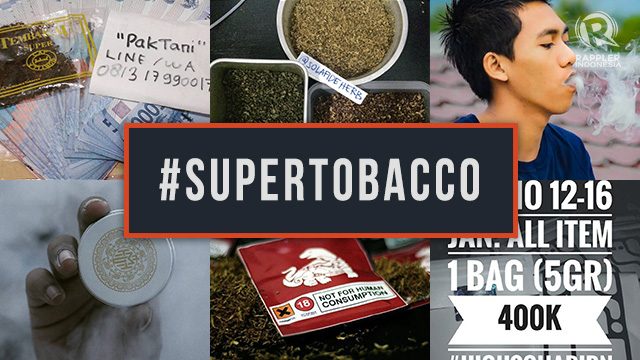
JAKARTA, Indonesia — The gold-foiled packet that Jay*, a 24-year-old who works in the digital industry, holds up is small – about 10×10 cm – and innocuous-looking. You could stow it easily in your pocket, or your wallet.
When opened, the contents seem similarly harmless. To the naked eye it looks just like ordinary tobacco, a familiar sight in a country of 61 million smokers.
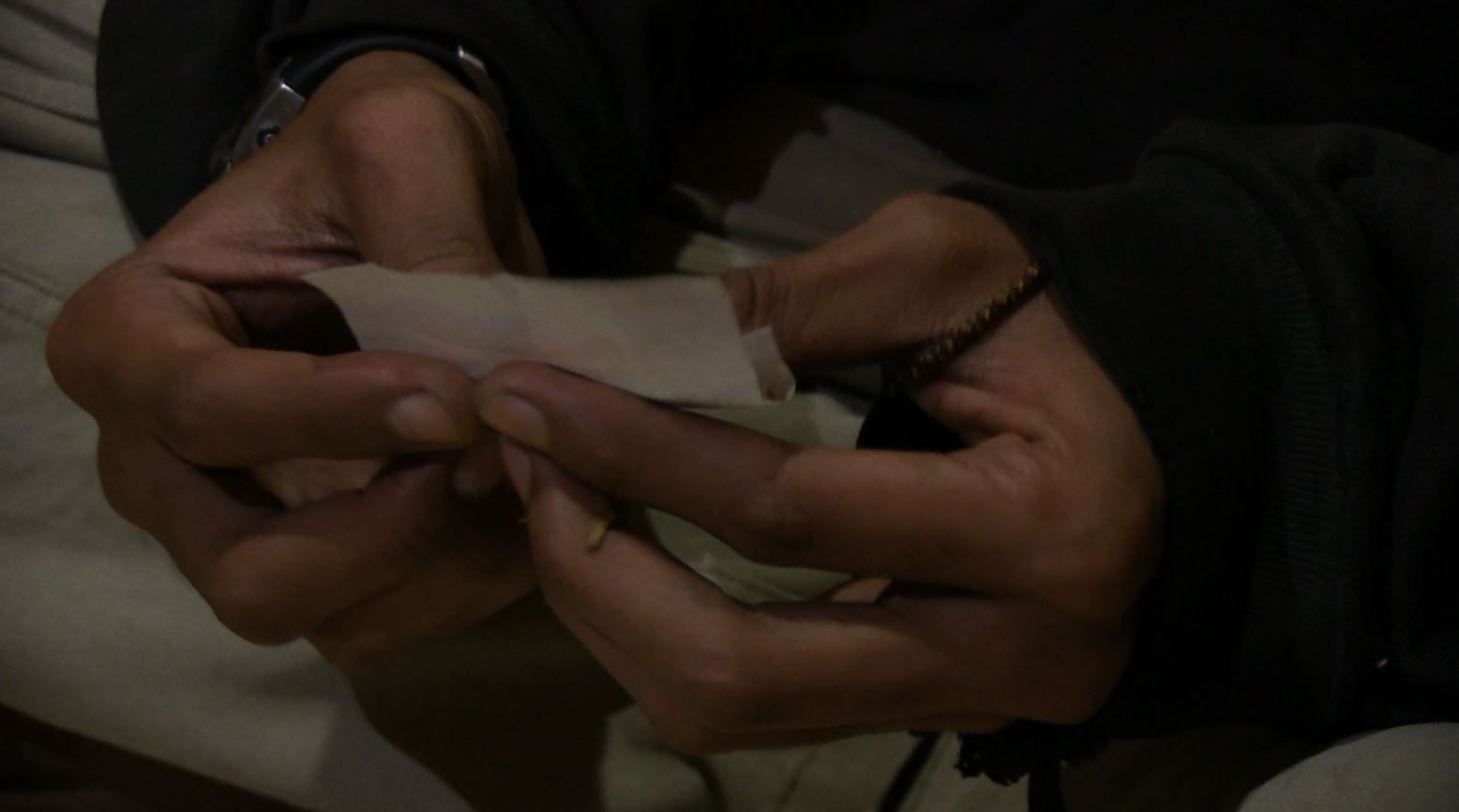
He takes a pinch or two from the packet and puts it on rolling paper. The resulting cigarette looks pretty much like a joint of marijuana. Sitting cross-legged on the floor of a dim apartment in Jakarta, he lights it up and takes a drag, and then another one. The effects are almost instantaneous, within a minute. His hands tremble, his eyes redden, and his body slackens.
“Two drags are enough to get high,” he murmurs, his eyes half-closed. “Your head feels heavy and your body feels limp.”
The high won’t last long, Jay says, maybe 20 or 30 minutes. He doesn’t want to take another drag, because he has seen what overuse looks like. “A friend of mine, it was as if he was possessed by a demon.” Convulsions, hallucinations, yelling.
Jay’s friend Dwi*, 30, says he experienced something similar when he had too much – 7 drags to be exact. “I felt like I was possessed,” he says. “I started getting very aggressive, like I wanted to fight everyone.”
Videos on Youtube show similar symptoms. One in particular shows a security guard writhing on a bed uncontrollably, sputtering gibberish and occasionally screaming while his friends, seemingly high as well, looked on and laughed.
These are the effects of so-called “super tobacco,” the street name of a drug that has recently been in the spotlight here in Indonesia. It consists of what is mostly normal tobacco that is mixed with a powdered form of the compound AB-CHMINACA, a synthetic cannabinoid – a drug that, though chemically different from cannabis, seeks to simulate the effects of marijuana.
Doctors consider AB-CHMINACA to be one of the more dangerous synthetic cannabinoids as, unlike marijuana, which only partially binds to cannabis receptors in the brain, AB-CHMINACA fully binds to receptors, making the effect of the drug all the more powerful.
So it’s not surprising when Jay says that real marijuana and super tobacco are very different.
“When you smoke weed the effect is stable,” he says. “This synthetic stuff is not stable. It’s weird.”
“When I smoke this, I feel like I’m being brought very high, and then not long after, I fall back down.”
As a regular drug user, Jay says he’d prefer marijuana, which he says is cheaper and “healthier”, but that he buys super tobacco because of its convenience (“It’s so easy to get”) and its efficiency (“The high is so much higher”).
‘Drunk’ pilot

“Super tobacco” particularly a variant known as “Gorilla brand tobacco,” came under the spotlight in Indonesia at the tail-end of 2016, when local airline pilot, Tekad Purna, made headlines after getting into a plane cockpit acting and sounding drunk.
CCTV footage shows him stumbling through airport security, dropping all his belongings, and getting through to his plane, just 15 minutes before his flight was scheduled to take-off.
Despite the many infractions he committed – coming late, not going through a medical check, missing the weather and flight conditions briefing – he managed to get all the way into the cockpit unimpeded.
It was the pre-flight announcement that finally thwarted Purna. Passengers said that he sounded “drunk” and kept repeating some words over and over. A few became so alarmed that they walked up to the cockpit demanding an explanation. Others said they wanted to get off the plane. In the end, the airline switched pilots.
Not long after the incident was reported, messages began circulating on WhatsApp groups that Purna had been on “gorilla tobacco,” one of the many brand names of so-called “super tobacco”. Netizens who were aware of the effects seemed convinced that Purna had used it. Former coworkers claimed that Purna has used psychoactive substances before.
The National Narcotics Agency says that there is no evidence of this since Purna’s drug test came back negative.
Slamet Pribadi, the agency’s head spokesperson, said that if Purna was using super tobacco it would have shown up in tests. “It would definitely have been detected, because it was in the same lab that identified AB-CHMINACA.”
But research in the United States suggests that it may be difficult to detect in standard drug screenings due to the ever-evolving nature of synthetics, and requires a complex process and high-tech machines that are only available in some laboratories.
‘Like ordering fast food’
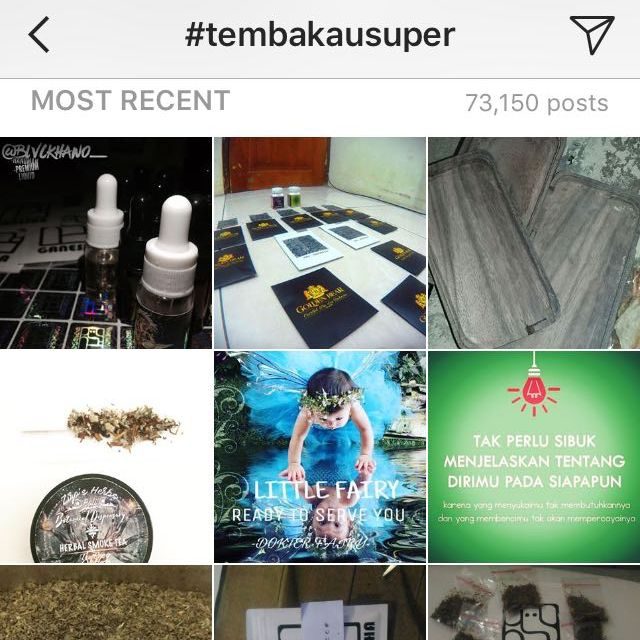
Dwi, a marketing professional, holds up Jay’s unfinished joint. “Can I light this spliff first?” he asks. “To make it more soulful.”
He takes a drag before speaking to us. Dwi, who like Jay uses drugs regularly, waxes a little poetic about marijuana, calling it God’s creation and comparing it unfavorably to the synthetic version.
“You can be creative on weed, productive,” he says. “On this stuff,” he holds up the joint. “You’re just a consumer.”
He adds that his heavy user friends refuse to smoke super tobacco because “it’s always a bad trip.”
Like Jay, Dwi says that if he could choose between marijuana and super tobacco, he would pick the former. But these days with the marijuana supply dwindling, he’s smoking more of the latter, mainly because it’s so easy to get. “It’s just like ordering fast food.”
The evidence bears this out. Type the hashtag “#tembakausuper” (#supertobacco) into Instagram and you will see over 70,000 posts, many of them from vendors selling the drug. The vendors put their contact numbers in their profiles making it trivially easy to order from them. One small time dealer, an undergraduate, said that he made up to 60 million rupiah or US$4,000 dollars just from selling online and to his fellow students.
One such vendor is called, simply, supertobacco. When you message the number provided on his Instagram account, you immediately receive a welcome message inviting you to order from him. When you order, he’ll ask you for contact details and a delivery address. He’ll then send his bank account number for payment, charging 300,000 rupiah or around US$20 for a 2.5-gram packet.
Within 15 minutes of ordering, the super tobacco will be packed and ready to go.
The package will be delivered via a popular motorcycle delivery service.
“If the delivery guy calls you for confirmation, just say it’s a football jersey,” he’ll advise. No other precautions will be taken.
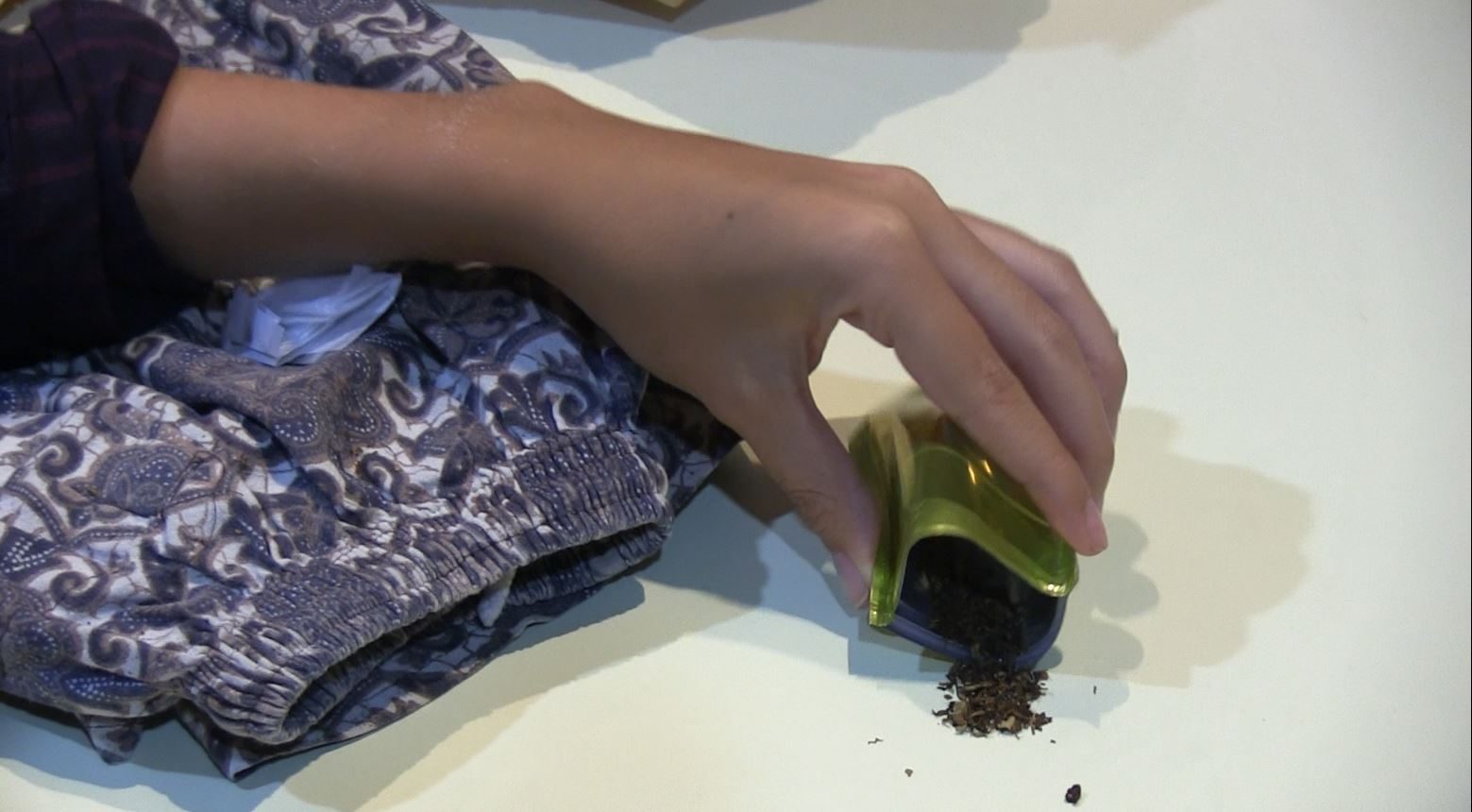
When it arrives, the package is double-wrapped in brown paper. Unwrapping the second layer reveals a pair of old batik shorts. And enclosed in the shorts, a single gold-foiled packet.
While other online drug transactions might require understanding of the dark web or bitcoin or other obscure technologies, to buy super tobacco in Indonesia you only need a mobile phone, an Instagram account and a bank account.
Long regulation process
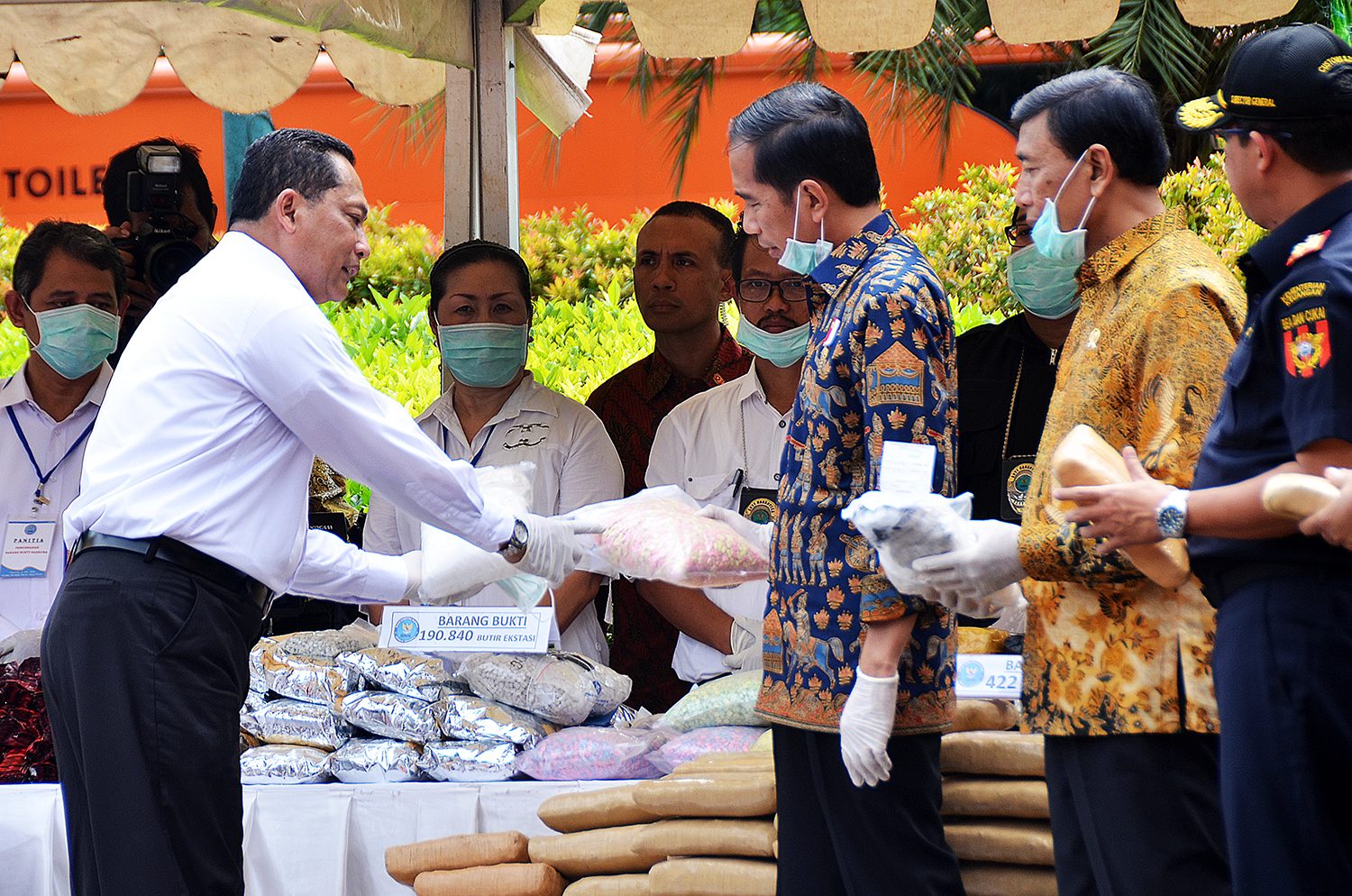
The ease at which we could access the drug is ironic, considering Indonesia has among the harshest drug laws in the world. Often, Indonesia makes headlines for executing its drug convicts, including foreign nationals. Under Indonesian President Joko “Jokowi” Widodo, 18 people have faced the firing squad due to drug-related crimes.
Back in February 2015, Jokowi declared the country to be in a “drug emergency”.
“Every day 50 people die because of drugs,” he said. “In a year, that means 18,000 people die because of drugs.” While human rights activists have questioned the statistics and have pushed for the abolition of the death penalty, Jokowi continues his relentless drug war, saying “there will be no mercy on this matter of drugs.”
But the problem of synthetic cannabinoids is not confined to Indonesia. Back in September 2015, the New York Times ran a story about a “synthetic marijuana” called K2 that was taking over East Harlem, turning 125th Street into “a street of zombies.” Like super tobacco, K2 was easy to access, with many bodegas or small corner shops selling it for only a few dollars.
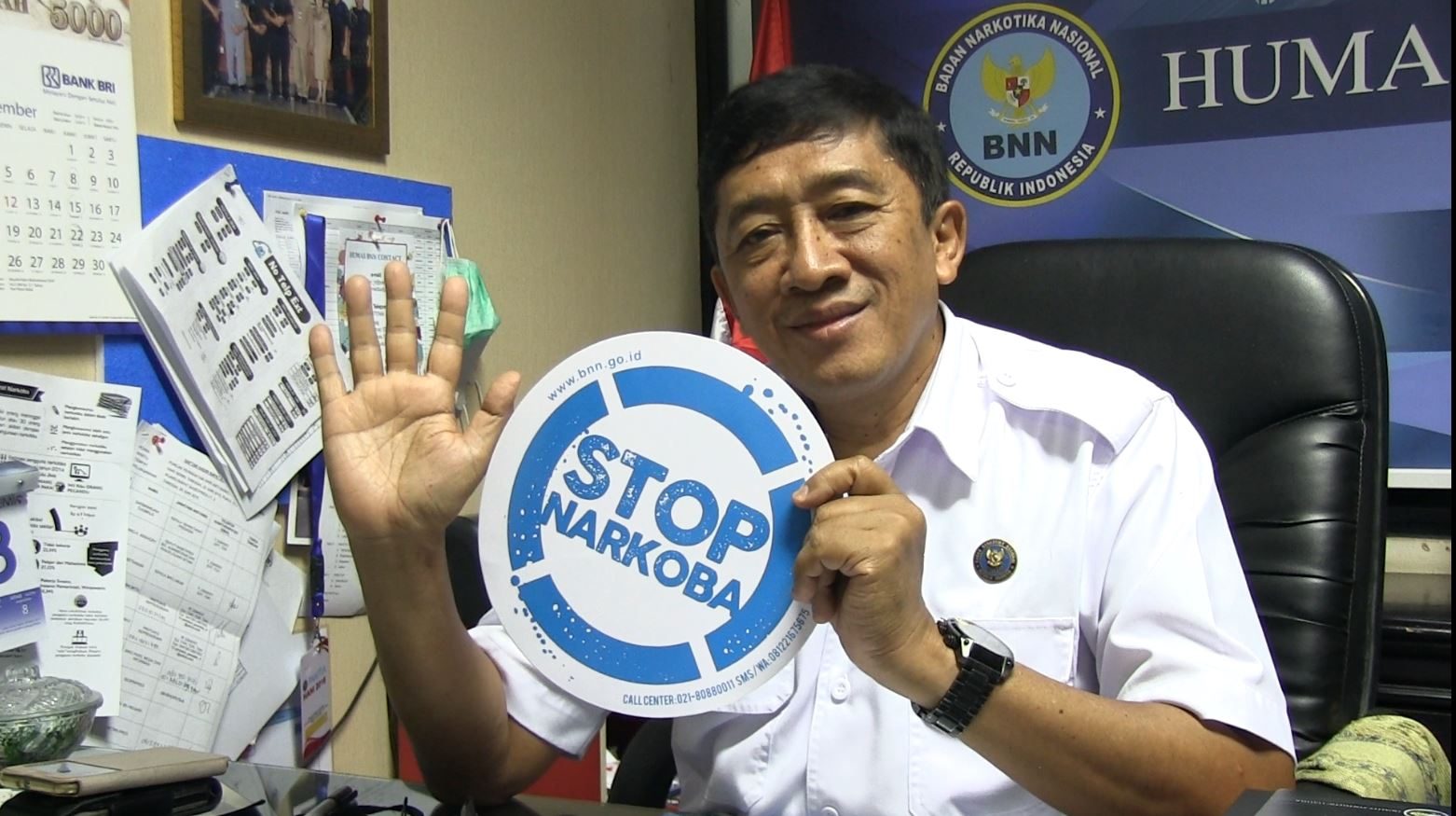
The National Narcotic Agency’s Pribadi, says that super tobacco has been on the agency’s radar since May of last year. He said that AB-CHMINACA, the active compound in super tobacco, is not produced here, but rather imported.
“Synthetic cannabinoids like AB-CHMINACA is still being imported,” he said in an interview at his office on January 11, 2017. “It has been confiscated a few times by customs at both Halim and Soekarno-Hatta airports.” He speculates that it is coming from the United States.
“They’re using these synthetic cannabinoids because looking for marijuana in Indonesia is now difficult, because law enforcement has actively destroyed marijuana plants in places like Aceh and Papua.”
“According to doctors, the effects of these synthetic cannabinoids are tremors, brief loss of consciousness, and then nausea,” he explained. “That brief loss of consciousness is said to feel like you’re being sat on by a gorilla. That’s why they call it gorilla brand tobacco.”
He said that doctors say at certain levels, super tobacco use can be fatal. At the time of the interview, Pribadi saud the substance was still unregulated.
“There are 18 different synthetic cannabinoids that have already been included in Indonesian drug laws,” he said. “AB-CHMINACA is not yet in there. We have already lobbied to the Ministry of Health for it to be put in there, and we should see it in the coming days.”
Pribadi explained that regulating a new drug can be a long process, taking up to 2 years. Once AB-CHMINACA is on the list, the possible punishment for dealers will be the same as for other recreational drugs like heroin or cocaine – ranging from 5 years imprisonment to death.
When asked about the ease of accessing super tobacco online, Pribadi said the government has tried to block harmful websites but that, with technological advancement, it can be a challenging task. “You block one, and a thousand new ones sprout up.”
He urged citizens to report websites selling such drugs to the National Narcotics Agency but admitted that until AB-CHMINACA is included in the drug law, his hands are tied.
Ironically, when Rappler did further research, we found out that AB-CHMINACA had been added to the list of regulated narcotics two days before our interview with Pribadi. Not even Pribadi knew that it had already been included.
Additionally, further research showed that the earliest media reports of gorilla tobacco consumption in Indonesia were in May 2015. It took the National Narcotics Agency a whole year to identify AB-CHMINACA as the tobacco’s active compund – about 10 years after it first hit the world market.
Will regulation help?
On January 9, 2017, the Ministry of Health added AB-CHMINACA as one of 27 new drugs regulated by the Narcotics Act No. 35 of 2009, making it officially illegal.
Despite this, the prevalence of super tobacco might not be as affected as Pribadi hopes – nor will it stop those who seek it.
Jay says that it would be a “dilemma” for him, but that there would definitely still be sellers.
“You can still buy marijuana which is already illegal,” he says. “Even if this becomes illegal there will still be buyers,” emphasizing that his consumption of the drug is not because it has yet to be criminalized.
Dwi is even more definite. “I’d probably use it less, decreasing the volume,” he says, laughing. “But still…”
He wouldn’t stop entirely. —Rappler.com
*Names have been changed to protect identities
Add a comment
How does this make you feel?
There are no comments yet. Add your comment to start the conversation.